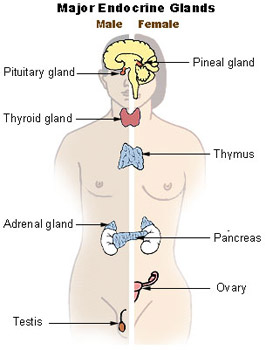The Endocrine System
Published .
The endocrine system, along with the nervous system, functions in the regulation of body activities. The nervous system acts through electrical impulses and neurotransmitters to cause muscle contraction and glandular secretion. The effect is of short duration, measured in seconds, and localized. The endocrine system acts through chemical messengers called hormones that influence growth, development, and metabolic activities. The action of the endocrine system is measured in minutes, hours, or weeks and is more generalized than the action of the nervous system. There are two major categories of glands in the body – exocrine and endocrine.
Exocrine glands have ducts that carry their secretory product to a surface. These glands include the sweat, sebaceous, and mammary glands and, the glands that secrete digestive enzymes.
The endocrine glands do not have ducts to carry their product to a surface. They are called ductless glands. The secretory products of endocrine glands are called hormones and are secreted directly into the blood and then carried throughout the body where they influence only those cells that have receptor sites for that hormone.
Hormones are carried by the blood throughout the entire body, yet they affect only certain cells. The specific cells that respond to a given hormone have receptor sites for that hormone. Hormones bring about their characteristic effects on target cells by modifying cellular activity.
Protein hormones react with receptors on the surface of the cell, and the sequence of events that results in hormone action is relatively rapid.

